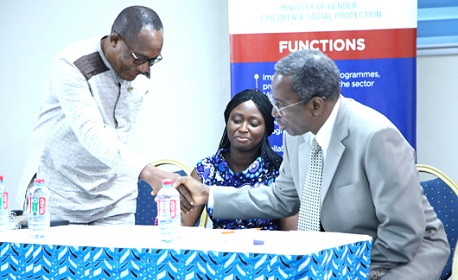
Framework on harmful cultural practices in the offing
A framework to provide guidance for engaging traditional authorities and faith-based leaders to address harmful cultural practices in the country is in the offing.
The framework also seeks to address sexual and gender based violence (SGBV), promote gender equality and the rights of women, girls and Persons With Disabilities (PWDs).
Advertisement
At a validation meeting in Accra the Director of the Ghana Productive Safety Net Project (GPSNP) at the Ministry of Gender, Children and Social Protection, Mawutor Ablorh, on behalf of the Minister Designate for the ministry, Lariba Zuweira Abudu, said the validation of the national framework for engaging traditional authorities and faith-based leaders was timely as it addressed the menace of gender discrimination and harmful practices perpetuated towards certain groups in the country.
Commitments
She said despite national legislations and international commitments that were set against the discrimination of people in all forms, negative cultural practices such as widowhood rites, trokosi rites, remained a major hindrance to the attainment of gender equality.
Hajia Abudu said it was vital to note that gender equality and women empowerment remained a powerful strategy for reducing poverty levels, social injustice among women and men, improve health standards and enhancing the efficiency of public and private sector investments and domestic finance globally.
“Thus, achieving gender equality is regarded as the attainment of human rights and a prerequisite for sustainable development,” she added.
Hajia Abudu urged stakeholders to contribute to the effective advocacy and engagement on issues of harmful cultural practices, gender based violence and inequalities that took place in communities.
The framework
The consultant drafting the framework, Magdalene Kannae, said the purpose for developing the framework was to provide guidance for engaging traditional authorities, faith-based leaders, civil society organisations (CSOs) and other relevant stakeholders in addressing such harmful cultural and discriminatory practices.
“It will also provide the Department of Gender, metropolitan, municipal and district assemblies (MMDAs) and CSOs with approaches or strategies to manage relations with all relevant stakeholders to address the negative practices in order to achieve equitable socio-economic development at the local level,” she said.
Giving the strategic objectives of the framework, she said it was to address the traditional cultural practices and gender inequality issues identified in the communities, by increasing the knowledge and awareness of the impact of traditional cultural practices, gender inequalities and GSBV.
She said it was also to increase collaboration with MMDAs to formulate by-laws on identified harmful or negative traditional cultural practices in the communities.
The United Nations Population Fund (UNFPA) country representative in Ghana, Barnabas Yisa, said in Ghana, where cultural practices and religious beliefs were instrumental in moulding the spiritual and moral fibre of society, there was no doubt that religious and traditional leaders served as integral agents in advancing rights, especially that of women and girls.
He said due to the unique roles traditional and faith-based organisations played in communities and in the lives of people, the UNFPA acknowledges the positive roles they could play in using religious and community platforms, to address beliefs and influence local norms, particularly those that put women and girls at risk of sexual violence and harmful socio-cultural practices including FGM and child marriage.
The Deputy Director for Gender at ministry, Vera Kakari Bediako, who spoke on behalf of the Chief Director for ministry Dr Afisah Zakariah, stated that the ministry was mandated to work towards ending gender inequalities, all negative cultural practices and stigmatisation to enhance the quality of life of citizens and protect the vulnerable in society against human rights abuses.
Writer’s email:[email protected]




